DVDs Round-Up 3 | reviews, news & interviews
DVDs Round-Up 3
DVDs Round-Up 3
The Hurt Locker, Inglourious Basterds, Antichrist, Harry Potter and much more
There's a strong distaff presence in theartsdesk's third DVD round-up. The headline film is Kathryn Bigelow's superb war thrillerThe Hurt Locker, currently mopping up awards in the US and a hot favourite for the Oscars. Also in the mix: Audrey Tautou as the redoubtable doyenne of French fashion in Anne Fontaine's Coco Before Chanel and Julie Christie in Sally Potter's avant-garde 1983 debut feature The Gold Diggers. Fear not, however: a robust testosterone level is maintained by Quentin Tarantino's Inglourious Basterds, by the hit stag-party comedy The Hangover and by Antichrist, Lars von Trier's "misogynist" (according to some) psychodrama. Harry Potter is the star of our box set of the month. The selection was made by Anne Billson, Ryan Gilbey, Sheila Johnston and Jasper Rees.
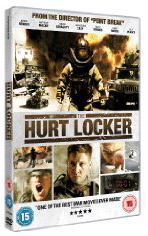 DVD of the Month
DVD of the Month
The Hurt Locker, dir. Kathryn Bigelow (Lions Gate Home Entertainment)
by Sheila Johnston
It all begins with a bang, of course. The Hurt Locker, Kathryn Bigelow's resonant film about an elite bomb disposal unit in Iraq, kicks off with an almighty explosion which blows away the squad's leader in the first few minutes. His replacement, Sergeant James (a mesmerising Jeremy Renner), is a loose cannon, if that's the right metaphor, a tearaway who plays ear-splitting heavy metal music, chain-smokes and takes a kamikaze view of his mission. War, as the film's opening epigraph posits, is a "potent and lethal addiction" for him.
As he waddles out through the cityscapes of parched rubble, in a thickly padded suit and helmet that make him look like an astronaut walking on Mars, James casually chucks aside the headset that allows his team talk to him and tosses out a smoke bomb that prevents them from seeing him. At one point he discards the protective suit too. His peers regard him as risking their own lives. But he comes to command their respect and eventually even a sort of affection.
Written and co-produced by the journalist Mark Boal, who spent two weeks embedded with such a unit in Baghdad, the film depicts a new, unprecedentedly treacherous kind of urban guerrilla warfare. The soldiers can't speak Arabic or even read the street signs; they have no way of recognising the enemy. When tentative relationships with the locals are formed they soon fizzle out or erupt into treachery. Nervously whirling and zooming, the camera, virtually a character in its own right, is constantly on the look-out for rooftop snipers or shopkeepers with mobile phones which will double as detonators (the Director of Photography is Britain's Barry Ackroyd, who works regularly with Ken Loach and shot the equally fleet and thrilling United 93).
The Hurt Locker starts in medias res, in a flurry of smoke and confusion. With its high-speed camerawork and editing, it looks at first like a documentary. Unfolding in a series of self-contained sustained action setpieces punctuated by very short snatches of downtime, it doesn't brood on America's role in the Middle East, and nor do the characters: surviving is more than enough to occupy their attention. Is their base called Camp Liberty or Camp Victory? Who cares?
Early reviews of The Hurt Locker when it premiered in Venice snorted that, as with other Iraq-themed films, no-one would want to see it. How wrong those critics were: in the event, it became a modest commercial success story in terms of a film made on this low budget. Now, with a clutch of gongs already on its chest, it is a front-runner for the Oscars - piquantly, Bigelow's former husband James Cameron is among the other chief contenders, for Avatar.
To be a superbly crafted action movie is an award-worthy achievement in itself. But the very best examples of the genre are always something more. In the late 1960s, the pioneering film critic Robin Wood, who died last month, made a brilliant case for the emotional and moral complexity of Howard Hawks's action films and comedies, at that time sniffily dismissed by British critics. Bigelow is one of the key directors working today to have inherited the Hawksian mantle.
The Hurt Locker's title refers to the extreme stress and pain of being constantly exposed to danger on the field of battle. On a second viewing, though, it seemed to me to refer equally to the fact that all the men are damaged goods who keep their deepest feelings tightly sequestered away. Tiny moments of communion assume great weight: when James gives his colleague and antagonist a sip to drink at the end of a long desert stake-out, it's as close as anyone comes to tenderness.
The film's final minutes find him on leave to see his estranged wife and pathetically lost and bewildered in a world where the big choice in life is which breakfast cereal to pluck from an enormous shelf at the supermarket. In a brief scene with his happily gurgling baby son (who all but steals it), he exposes his feelings, and then in a trice he's back in the fat padded suit, hooked on the drug of war again. The Hurt Locker may have started with a bang. But it ends with a resounding whimper. Find The Hurt Locker on Amazon here
Other Releases
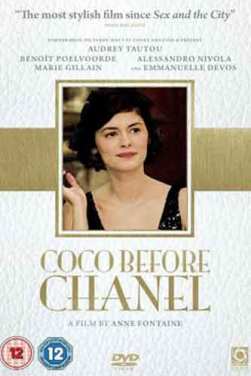 Coco Before Chanel, dir. Anne Fontaine (Optimum)
Coco Before Chanel, dir. Anne Fontaine (Optimum)
by Anne Billson
Chanel once said, "Simplicity is the keynote of all true elegance", and Coco Before Chanel keeps it simple, and very elegant. It's not one of those biopics which lays out the whole kit and caboodle of its subject's life, so it's no good expecting to see the designer's affair with a German officer during the Second World War. This is the making of the legend rather than the legend itself, with director and co-writer Anne Fontaine dropping plausible hints about the sources of her developing visual aesthetic which led to a revolution in women's fashion: the starched austerity of the Roman Catholic orphanage where she was raised, the fishermen's jerseys she spots on her first trip to the seaside, or the adapted menswear which are depicted as chic yet comfortable alternatives to the furbelows and restrictive corsets then in vogue.
It's also a sobering reminder, for women of my generation, of how fortunate we were to be born in 1954, say, as opposed to 1883, when if you weren't born rich your only options were to become a seamstress, a chanteuse or a prostitute. "Coco" Chanel ("coco" being a French term of endearment; her real name was Gabrielle) cobbles together a meagre living with the first two options before foisting herself on a rich admirer - millionaire Étienne Balsan - and virtually compelling him through sheer force of character into making her his mistress. She then falls madly in love with an English toff called Arthur "Boy" Capel, who can't marry her because she's beneath him. But he helps her set up a hatshop, which in turn leads to her first womenswear collection. End of story.
If you ever imagined being groped by a drunken millionaire would be a cushy way of getting ahead, Fontaine's film gently disabuses you. The excellent Belgian actor Benoît Poelvoorde (still probably best known on this side of the Channel as the serial killer from Man Bites Dog) plays Balsan as monstrous, yet not entirely unsympathetic; Chanel's relationship with him is an intriguing study in interdependency, and it's this rather than her romance with Capel (American actor Alessando Nivola, slightly miscast) which gives this costume pic its backbone. Audrey Tautou's fearlessly uningratiating performance should be a revelation to anyone who still thinks of her as Amélie; she has somehow managed to sharpen her features into a fearsome display of iron will, and chain-smokes with such panache I swear quitters will be tempted to take the habit up again. Find Coco Before Chanel on Amazon here
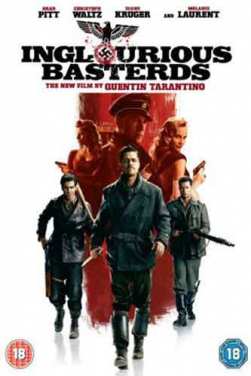 Inglourious Basterds, dir. Quentin Tarantino (Universal Pictures)
Inglourious Basterds, dir. Quentin Tarantino (Universal Pictures)
by Anne Billson
It's not every day you find yourself surrounded by spectators who are so obviously glued to the screen, hanging on every word of dialogue, laughing and gasping in all the right places. It would seem that with Inglourious Basterds, Quentin Tarantino has got his biggest popular hit since Pulp Fiction, though whether it's his masterpiece, as jokily proposed in the very last line of the film, is arguable.
Structure-wise, this alternative World War Two yarn is all over the place, not so much a flowing narrative as a bunch of separate episodes jammed together with "chapter headings" like A German Night in Paris or Operation Kino. The two main plot threads never knit together properly, and the strand featuring Brad Pitt and his Nazi-killing "basterds" could probably have been dispensed with altogether (the film is around 20 minutes too long), though it does lead, indirectly, to one of the film's highlights - an amazingly tense imbroglio of impersonation and party game in a basement bar. The other strand features French actress Mélanie Laurent as a Jew whose family is slaughtered by Nazis; she alone escapes and ends up running a cinema in Paris. As you do. When it's chosen as the venue for the gala premiere of a Nazi propaganda screening in front of Hitler and other Nazi bigwigs, she seizes the opportunity to plot an elaborate revenge.
It's also not every day you find yourself watching a Hollywood movie which credits audiences with the intelligence to accept non-Anglophones speaking in their native languages, with subtitles. The film revels in language, not just English, and Tarantino's multilingual cast does him proud. Pitt is absurd, of course, but his absurdity gives rise to a nice joke at the expense of monoglot Americans. I've never warmed to Diane Kruger before, but she's great here as a glamorous German film-star who spies for the Allies, and Michael Fassbender is also good value as an English lieutenant posing as a German officer. But romping away with the show is the hitherto little-known Austrian TV actor Christoph Waltz as a Jew-hunting Nazi Colonel, a lethal charmer who slips between German, French and English dialogue with insolent ease.
There are cinematic in-jokes, of course, droll cameos (Rod Taylor as Churchill!) and a sprinkling of the old ultra-violence, but what impresses most is how Tarantino has turned his back on the current trend for the sort of machine-gun editing, flashy-for-the-sake-of-it camerawork and excessive CGI which make chopped liver out of so many thrillers and action movies these days (and which will no doubt look hideously dated in only a few years' time). Instead, it's a pleasure to watch almost classical framing, compositions and editing, with plenty of time allowed for the tension to kick in and build up to a couple of old-fashioned visual coups which take the breath away. Inglourious Basterds is often very silly. But it's also a blast. Find Inglourious Basterds on Amazon here
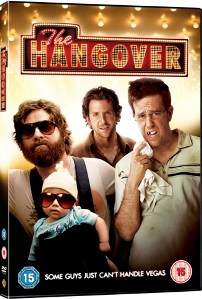 The Hangover, dir. Todd Phillips (Warner Home Video)
The Hangover, dir. Todd Phillips (Warner Home Video)
by Jasper Rees
Four guys head for Vegas for a pre-nuptial bachelor party, where every conceivable form of moral malpractice is joyously indulged: it couldn’t be argued that The Hangover has much to offer the mature female demographic. Puerile males of all ages are another matter. Early on in their epic debauch the wassailers somehow contrive to mislay the groom. And they kind of need to get him back for the wedding. Locating him involves reconstructing the missing hours in the face of Rohypnol-powered memory wipe. What fleshes this out from mere fratpack gross-out fare is the humanity of the trio of groomsmen, who are all in their way hopeless cases. Ed Helms plays a pussy-whipped dentist, Bradley Cooper a jaded lotus-eater and, in the film-stealing performance, Zach Galifianakis a friendless loser on tranqs. Indeed the closest the movie gets to starpower is Heather Graham doing one of her enticing turns as a doe-eyed hooker. The screenplay inventively hurls then into a series of gag-packed scrapes involving Mike Tyson’s pet tiger, a camp white-suited Chinese gangster and a very delectable baby. What happens in Vegas stays in Vegas. Except herpes. And this top-drawer screwball vomcom. Joy of joys, it’s even weirdly heartwarming too. Find The Hangover on Amazon here
Antichrist, dir. Lars von Trier (Artificial Eye)
by Ryan Gilbey
 In Lars von Trier’s succès de scandale, Charlotte Gainsbourg plays a nameless woman who flees to a forest cabin with her therapist husband (Willem Dafoe) to recover from the loss of their infant son. The nipper plunged to his death while his parents were rapturously screwing in monochrome slo-mo, so guilt weighs more heavily than usual on the bereaved. But when Gainsbourg and Dafoe go down to the woods, they’re met by a big surprise: nature itself seems to be turning against them, in the form of a creepy talking fox, a most unBambi-like deer and an oak tree that rains acorns on their roof in the middle of the night.
In Lars von Trier’s succès de scandale, Charlotte Gainsbourg plays a nameless woman who flees to a forest cabin with her therapist husband (Willem Dafoe) to recover from the loss of their infant son. The nipper plunged to his death while his parents were rapturously screwing in monochrome slo-mo, so guilt weighs more heavily than usual on the bereaved. But when Gainsbourg and Dafoe go down to the woods, they’re met by a big surprise: nature itself seems to be turning against them, in the form of a creepy talking fox, a most unBambi-like deer and an oak tree that rains acorns on their roof in the middle of the night.
The battles here are between mankind and nature, order and anarchy — the analytical mind versus the messy, ungovernable body. Order is presented in the film as a male preserve, anarchy as female, which would be outrageous if our sympathies didn’t lie almost entirely with the woman. For all the horrors that Gainsbourg visits upon Dafoe, it is her outbursts of unbridled grief that provide the soul of the movie (and which must have clinched her Best Actress prize at Cannes last year).
The nameless characters are presumably von Trier’s way of suggesting some symbolic everyperson quality, but Antichrist is at its least persuasive when you feel the script coasting on generalisations about the chasm between genders. Von Trier has invoked Tarkovsky (to whom the film is dedicated) and Strindberg, but the impression is more redolent of a self-help manual in the Men Are from Mars, Women Are from Venus mould, with the obvious difference that the book doesn’t feature, as the film does, a penis which ejaculates blood.
You can also discern the influence of David Cronenberg’s The Brood, another movie in which marital discord manifests itself in biological horror, and therapy is seen as several rungs down from Satanism. But Antichrist is pure von Trier in its mix of raw sincerity and disingenuous shock tactics. While the reputations of Breaking the Waves, The Idiots and Dogville seem largely assured, it feels like we’ll be chewing over Antichrist for years to come. Find Antichrist on Amazon here
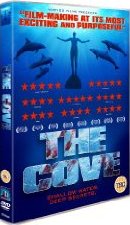 The Cove, dir. Louie Psihoyos (E1 Entertainment)
The Cove, dir. Louie Psihoyos (E1 Entertainment)
by Jasper Rees
The rise of the documentary feature was one of the stories of the cinematic decade. When Michael Moore and Al Gore took home Oscars for very different forms of campaigning film, it was a validation for the entire genre. The Cove is just as keen to give the enemy a bloody nose. To do so, it deploys the grammar of the thriller. The narrative focuses on a secluded patch of water in Taiji, Japan, to which access is mysteriously disallowed. It’s here that thousands of dolphins are rounded up each year. The lucky ones are sold to dolphin theme parks around the globe for $150,000 a pop. But the majority end up being sold as mislabelled whale meat. No matter that dolphin flesh holds dangerously toxic levels of mercury.
Leading the charge against the might of the Japanese whaling lobby is Ric O’Barry, the guy who used to train the dolphin star of Flipper back in the 1960s. When his dolphin died in his arms, apparently by refusing to take another breath, it confirmed his fears that, however wide that deceptive smile, dolphins in captivity are as prone to depression and distress as any other mammal denied natural freedom of movement. He launched himself on a long campaign of direct action. The more dolphins he released, the more he was arrested. Increasingly, the focus of his obsession narrowed down on that fenced-off cove in Japan. Now a gnarled old fox, he has all the hallmarks of the bug-eyed single-issue paranoiac. But that didn’t stop him persuading a crack team of experts from different fields to join him on a mission to expose the slaughter in Taiji.
Even when not showing the snatched footage of covert preparations, The Cove rarely loosens its grip on your lapels. The argument about Japan’s flagrantly dishonourable tactics in the International Whaling Commission are carefully exposed. The thuggish antics of the industry’s apologists evoke uncomfortable memories of The Bridge on the River Kwai. And the footage they manage to capture - by planting ingeniously hidden cameras at the scene of the crime - provides a climax of shocking potency. To sound a pragmatic note, the true test of such a film is in its measurable impact. The odd person has lost his job. Japanese schoolchildren are no longer to suffer the prospect of compulsory dolphin meat in their lunchboxes. But the only way that this compelling documentary can say that its work is done is when this DVD is required viewing in every household in Japan. In the meantime, visit the film's official website to find out about the direct action you can take. Find The Cove on Amazon here
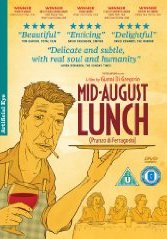 Mid-August Lunch, dir. Gianni di Gregorio (Artificial Eye)
Mid-August Lunch, dir. Gianni di Gregorio (Artificial Eye)
by Ryan Gilbey
This Italian gem, ideally watched with a group of gently sozzled but discerning friends and relatives, gives family entertainment a good name. Gianni di Gregorio, the picture’s writer-director, plays Gianni, an amiable, undemonstrative man in his fifties who still lives with his 90-year-old mother. During the midsummer Ferragosto celebrations, he finds himself saddled with caring for two other men’s elderly mothers (plus an aunt) and presiding over a feast to keep them all sated and smiling. It squeezes more insights, compassion and gently bubbling gags into its 75 minutes than most films could manage in double that time, and leaves you feeling like you’ve been simultaneously hugged and tickled. Weirdly, di Gregorio also wrote the violent and incisive crime drama Gomorrah, which I suppose you could call another family film, in the Corleone sense at least. Find Mid-August Lunch on Amazon here
Re-release of the Month
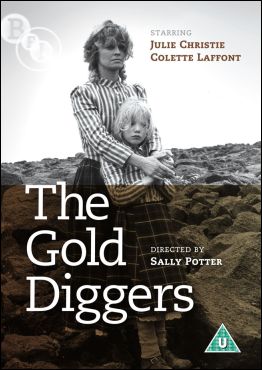 The Gold Diggers, dir. Sally Potter (BFI)
The Gold Diggers, dir. Sally Potter (BFI)
by Sheila Johnston
Incredible as it seems today, just over a quarter of a century ago (half an eternity before Big Brother) Channel 4 co-funded this black-and-white, Marxist/lesbian-feminist/structuralist avant-garde sci-fi musical. The observation is not made in a spirit of dewy nostalgia: Sally Potter's elusive, infuriating feature debut will be eyed as terminally pretentious by all hostile to its endeavour. And The Gold Diggers is certainly has its flaws, as the director herself would admit. But what an intriguing film it now emerges to be.
Impossible to encapsulate the plot. Conceived within the underground movement and born when British film culture was steeped in high theory, mainly emanating from across the Channel, it's a sort of free-form meditation on money, gold, power and the place of women as objects of exchange within patriarchal capitalism. Some mighty big ideas there, then.
The film expresses these playfully, however, in a series of fragmented, but vivid vignettes. At a society ball, Julie Christie's simpering belle is swept away on a white charger by a mysterious woman (Colette Laffont); a little blonde girl plays in a wooden shack nestling amid majestic mountains (the budget stretched to locations in Iceland); sinister men in suits stalk with malevolent intent through expressionist, Kafkaesque offices and cityscapes. There is tap-dancing and there are waltzes; the suits march through a formation number while singing about frozen assets.
The film wasn't a goldmine for anyone at the time, but now it emerges as a small buried nugget: a celebration of Christie's pellucid beauty, a bonkers piece of performance art, a newly timely satire on Western greed and a memento of a long-gone era when formal experimenters tried to nudge (as did too Peter Greenaway and Derek Jarman) towards the mainstream. Not least, it's worth seeing as the maiden voyage of one of Britain's most singular directing talents. Potter went on to adapt Virginia Woolf's Orlando in a film which made a star of Tilda Swinton, who played the gender-bending, time-travelling hero/ine; this was followed by The Tango Lesson, The Man Who Cried, Yes (written in rhyming couplets) and, last year, Rage, a satire on the fashion business.
The extras on this title are particularly useful: the DVD includes five rare early shorts by Potter, including the sassy musical The London Story (1986) and her calling-card film, Thriller (1979), a revisionist version of Puccini's La Bohème that quickly became a cornerstone of women's and film studies courses. A booklet of essays, some new, some reprinted, take the measure of the director and her long, against-the-odds career. Find The Gold Diggers on Amazon here
Box Set of the Month
 Harry Potter: Years 1-6 (Warner Home Video)
Harry Potter: Years 1-6 (Warner Home Video)
by Jasper Rees
Perhaps it would have been naive to expect anything else of Warners. A new Harry Potter multi-pack turns up hot on the heels of the one that was still being heavily marketed just before Christmas. The difference, of course, is that the all-new box set has Harry Potter and the Half-Blood Prince slotted in alongside its stablemates. If you fancy spending almost as much on a single DVD as on the six-strong set, the latest film in the series is available on its own with the usual bolt-ons, gimmes and behind-the-scenes extras to justify the price. As the seventh and eighth films make their way into cinemas and thence onto DVD, this trick will no doubt be repeated.
Watching back-to-back Potter films is not for everyone. If you can stomach it, though, it is interesting to note the areas where the films improve and in others stand still. Set against its successors, it looks increasingly mysterious that Chris Columbus, with Home Alone to his name, was asked on the basis of his rapport with Macaulay Culkin to direct a large cast of children and ripe old stage hams for the first two films. Harry Potter and the Philosopher’s Stone plods lumpenly along with little feel for the texture of JK Rowling's skilful plotting. Harry Potter and the Chamber of Secrets is a marginal improvement, particularly in the boy wizard’s climactic face-off with a well-realised basilisk. But it wasn't until Columbus left (sadly along with Richard Harris’s Dumbledore) that the series starts to click cinematically. It helps that Harry Potter and the Prisoner of Azkaban remains Rowling’s most satisfying story of the seven, with an ingenious ending that loses none of its pleasures with a second viewing. Alfonso Cuarón exhibited a much darker feel for Hogwarts’ lushly gothic elements. So too, to give him his due, did Mike Newell in the robustly plotted Harry Potter and the Goblet of Fire.
There’s no denying the intrusion of sequence fatigue in the next two films, both directed by David Yates (who will also finish the series): Harry Potter and the Order of the Phoenix, and the latest. The problem is partly ingrained: a film which ends on a cliffhanger can't help being inherently unsatisfactory. (With the odd obvious exception.) There’s a case to be made for saying the moment of purest invention in The Half-Blood Prince comes not at the climax when Michael Gambon’s Dumbledore meets his well-publicised quietus (you were seriously expecting a spoiler alert, were you?) but at the beginning, when three Death Eaters fly rings round the footway formerly known as the Wobbly Bridge, tossing pedestrians hither and thither. For viewers eager to devour the next chapter, that’s where the box set steps in. You don’t have to hang around a year for the next instalment.
It’s also intriguing to watch the three young leads grow ever so slightly less wooden over the years. After Equus, no one slags off Daniel Radcliffe’s acting any more, while Emma Watson’s overactive eyebrow work grows mercifully less pronounced with each release. Rupert Grint continues to ape Ron Weasley’s gormlessness much as he did as a 10-year-old, but that could be the character’s fault. Of course the acting around them provides all the scaffolding anyone could ask for. Alan Rickman continues to chew the computer-generated furniture with unrivalled relish, and Jim Broadbent does a lovely turn as Horace Slughorn in the new one, but the star cameo of the later films is undoubtedly Helena Bonham Carter as the cackling Bellatrix Lestrange. Only two more box sets to go. Find Harry Potter: Years 1-6 on Amazon here
BRAD PITT’S BIG MOMENTS
Allied. Doomed but entertaining attempt to revive 1940s Hollywood
Fury. David Ayer and Brad Pitt take the war film by the scruff of the neck
Inglorious Basterds. Pitt is gloriously absurd in Tarantino WW2 alternative history
Killing Them Softly. Brad Pitt cleans up an almighty mess in Andrew Dominik’s high-calibre crime ensemble
Moneyball. How Billy Beane created a revolution in Major League baseball
The Big Short. Pitt’s on the money as director Adam McKay successfully makes a drama out of a crisis
The Counsellor. Ridley Scott ensemble thriller is nasty, brutish and short or mysterious, upsetting and alluring
The Tree of Life. Terrence Malick’s elliptical epic leads us through time, space and one family’s story
PLUS ONE TURKEY
World War Z. It's World War with a Zee as Brad Pitt battles the undead and a zombie script
more Film
 Fantastic Machine review - photography's story from one camera to 45 billion
Love it or hate it, the photographic image has ensnared us all
Fantastic Machine review - photography's story from one camera to 45 billion
Love it or hate it, the photographic image has ensnared us all
 All You Need Is Death review - a future folk horror classic
Irish folkies seek a cursed ancient song in Paul Duane's impressive fiction debut
All You Need Is Death review - a future folk horror classic
Irish folkies seek a cursed ancient song in Paul Duane's impressive fiction debut
 If Only I Could Hibernate review - kids in grinding poverty in Ulaanbaatar
Mongolian director Zoljargal Purevdash's compelling debut
If Only I Could Hibernate review - kids in grinding poverty in Ulaanbaatar
Mongolian director Zoljargal Purevdash's compelling debut
 The Book of Clarence review - larky jaunt through biblical epic territory
LaKeith Stanfield is impressively watchable as the Messiah's near-neighbour
The Book of Clarence review - larky jaunt through biblical epic territory
LaKeith Stanfield is impressively watchable as the Messiah's near-neighbour
 Blu-ray/DVD: Priscilla
The disc extras smartly contextualise Sofia Coppola's eighth feature
Blu-ray/DVD: Priscilla
The disc extras smartly contextualise Sofia Coppola's eighth feature
 Back to Black review - rock biopic with a loving but soft touch
Marisa Abela evokes the genius of Amy Winehouse, with a few warts minimised
Back to Black review - rock biopic with a loving but soft touch
Marisa Abela evokes the genius of Amy Winehouse, with a few warts minimised
 Civil War review - God help America
A horrifying State of the Union address from Alex Garland
Civil War review - God help America
A horrifying State of the Union address from Alex Garland
 The Teachers' Lounge - teacher-pupil relationships under the microscope
Thoughtful, painful meditation on status, crime, and power
The Teachers' Lounge - teacher-pupil relationships under the microscope
Thoughtful, painful meditation on status, crime, and power
 Blu-ray: Happy End (Šťastný konec)
Technically brilliant black comedy hasn't aged well
Blu-ray: Happy End (Šťastný konec)
Technically brilliant black comedy hasn't aged well
 Evil Does Not Exist review - Ryusuke Hamaguchi's nuanced follow-up to 'Drive My Car'
A parable about the perils of eco-tourism with a violent twist
Evil Does Not Exist review - Ryusuke Hamaguchi's nuanced follow-up to 'Drive My Car'
A parable about the perils of eco-tourism with a violent twist
 Io Capitano review - gripping odyssey from Senegal to Italy
Matteo Garrone's Oscar-nominated drama of two teenage boys pursuing their dream
Io Capitano review - gripping odyssey from Senegal to Italy
Matteo Garrone's Oscar-nominated drama of two teenage boys pursuing their dream
 The Trouble with Jessica review - the London housing market wreaks havoc on a group of friends
Matt Winn directs a glossy cast in a black comedy that verges on farce
The Trouble with Jessica review - the London housing market wreaks havoc on a group of friends
Matt Winn directs a glossy cast in a black comedy that verges on farce

Add comment